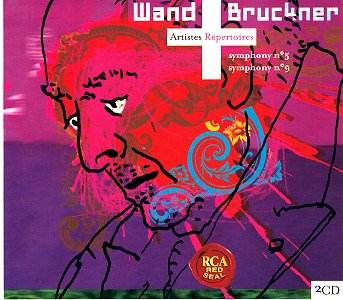There is no question that Günter Wand is one of the great Bruckner conductors, and his various recordings and performances are never less than compelling. Once again it proves so here, as French RCA reissue these performances of the Fifth and Ninth Symphonies in a two-disc folder in their 'Artistes Répertoires' series.
The recordings are quite recent and sound well, particularly
the Fifth Symphony. They are taken down from concerts in Hamburg. The
Ninth is good too, but it was recorded in Lubeck Cathedral, where the
resonant acoustic encouraged Wand to employ slightly more relaxed tempi
than he might otherwise have done. Not that the music suffers: Bruckner
of all symphonic composers can benefit from a church acoustic, and in
some respects his music was conceived with just such an acoustic in
mind.
Having said that, Wand's tempi are broad in the first movement of the Ninth; broader, for instance, than he chose in his earlier Cologne recording (1979) or in his recent BBC Symphony Orchestra Prom (August 2001). There is certainly room for more drama, for example a more febrile tension in the developments, but this caveat is amply offset by the magnificent richness of the chorale tuttis, with resplendent brass. The first movement of the Ninth is arguably Bruckner's greatest single achievement, and Wand makes out a strong case in this eloquent interpretation.
The strange, hammering scherzo can sound more dramatic in a studio acoustic, but Wand articulates great power, with an equally compelling trio, in which the tempo is faster still (as Bruckner requested). The long, eloquent slow movement is unfolded with a clear long-term vision, and the performance therefore satisfies the listener completely, without regret that the finale was never completed. Rightly did Bruckner call this 'a farewell to life'.
The Fifth Symphony is more urgently argued, taken from two Hamburg concerts in 1989. The sound is most pleasing: rich, ample and full-bodied, with details also well captured in the perspective. The dynamic range makes a good impact - an important consideration with this composer - though Karajan on DG has more presence still.
Wand's performance is meticulously prepared, the phrasing thoughtfully articulated and the orchestral ensemble very well disciplined, perhaps reflecting the fact that Wand and his orchestra took this piece on a British tour at the time the recording was made. The outer movements generate appropriate power and momentum, but the slow movement is taken rather quickly; Karajan certainly offers more gravitas than this. Wand, however, with his masterly phrasing and articulation, makes the music seem absolutely right, so there is room for both approaches.
The scherzo is one of Bruckner's most subtle, and Wand's attention to details brings many orchestral felicities into focus. But it is the outer movements on which a performance of the Fifth will stand or fall, and Wand's masterly architectural grasp ensures that when chorale and fugue are ultimately united in the symphonic vision, the result is both compelling and overwhelming.
In common with other issues in this series from French RCA,
the accompanying documentation is woefully thin. Moreover it is over-designed,
with small print on a coloured background, so even if the notes had
been worth reading, it would have been a real struggle to do so.
Terry Barfoot

